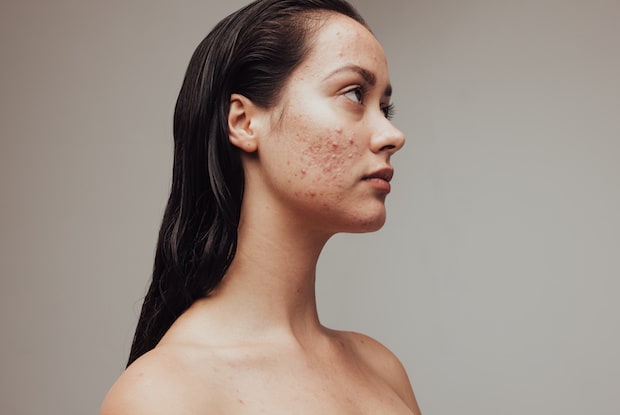Table of Contents
What is Acne?
a. Acne Overview
Acne is the most common skin condition in the United States, affecting around 50 million people every year. Acne is most common amongst teenagers and young adults, although it can affect people of any age. Around 85 percent of people aged 12-24 suffer from minor acne at least once. [1] Acne is not just a condition that affects young people and the frequency of adult acne is increasing. Acne is more common in males during adolescence. However, adult acne is more likely to occur in females. [2] Severe acne can be painful and can cause emotional stress if it is properly treated with medications like Azelex Cream and Retin-A Cream.
b. Symptoms of Acne
Acne is a skin condition that can cause several different pimples and skin blemishes. The symptoms of acne will depend on the severity of the condition. Skin lesions caused by acne usually occur on the face but may also affect other parts of the body such as the neck, shoulders, chest, and back. [2] Pimples, also known as zits or spots, are persistent red blemishes or swelling of the skin. Pimples can become inflamed and fill with pus. Acne sufferers may get various types of blemishes, including:
Blackheads – These dark spots are visible on the surface of the skin and have open pores in their center.
Whiteheads – These are small flesh-colored bumps under the skin with no obvious opening.
Papules – These are red or pink lumps that are filled with pus and are caused when whiteheads and blackheads cause irritation and become inflamed.

Nodules – These are similar to papules but may be more inflamed or significantly larger.
Cysts – These are clearly visible spots that are typically painful and often leave scars. [2] [3]
In addition to pimples, acne may also cause long-term black spots. These can last for years and cause permanent scars after cysts and nodules clear. Acne may also cause or worsen low self-esteem and depression. [4]
Keep reading to learn about what causes acne in teenagers and adults and the treatments available.
What Causes Acne?
Many people think they know the causes of acne. However, you may be surprised to learn that typically, acne is not a result of poor diet, poor hygiene or excess cosmetics. These factors may, however, worsen the condition. Usually, both adolescent and adult acne is caused by the same factors.
Acne happens when skin pores become clogged or blocked. Almost all skin pores act as the opening to a follicle containing a hair and an oil gland. This gland releases an oil known as sebum that keeps skin soft. When there is a problem in this process, acne may occur. [5]
Common causes of acne include:
- Excess oil production in the follicles.
- A build-up of bacteria in the pores
- Pores clogged by dead skin cells [6]
a. Excess Oil Production
Puberty causes the production of high levels of a group of hormones called androgens. Androgens include testosterone, which increases the amount of the sebum oil produced in the follicles. This is why acne is more common in teenagers and young adults. [2]
b. Build-up of Bacteria
When there is a build-up of sebum oil, it can clog the opening to hair follicles, causing bacteria to grow. These bacteria cause blackheads and whiteheads, which are the most common forms of acne. Occasionally, this build-up results in the wall of the hair follicle breaking, which causes sebum to leak into the skin tissue. This causes inflamed pimples, including papules and nodules.
c. Dead Skin Cells
Skin cells are always growing, and the outer layer of skin is constantly being shed. Occasionally, dead skin cells can get stuck in sebum oil, especially during puberty. This can then cause a blockage in the pore. [5]

Risk Factors for Acne
a. Hormones
Androgens, including testosterone, cause glands to produce more sebum oil. This increase in oil production can cause or worsen acne. The number of androgens in the body increase during puberty. However, other causes of hormones can also cause or worsen acne. This includes pregnancy and menstrual cycles, which is why adult acne is more common in women. [6]
b. Diet
Many people believe that acne is caused by an unhealthy diet. Research into specific foods such as sugar and chocolate are not conclusive. However, eating a high-sugar diet can increase the production of skin oils, worsening acne.
Vitamins A, D and E are anti-inflammatories that can help keep skin healthy. Vitamin A is common in salmon, apricots, mangoes and some vegetables. Vitamin D is commonly found in cheese, egg yolks and fatty fish. Vitamin E is an anti-inflammatory and is common in almonds, hazelnuts, fortified cereals and sunflower oil. Once again, research is not conclusive about the benefits of these vitamins, specifically for acne. [7] [8] [9]
c. Stress
Stress is not a cause of acne but can trigger breakouts and worsen existing acne. Stress can increase the production of CRH (corticotrophin-releasing hormone) that may increase the production of sebum in the skin, causing pimples. Stress may also indirectly affect acne. People that are stressed may forget their regular skin-care routines or eat more readily-available processed food. [10]
d. Medications
Some medications may also cause acne. Acne is a common side effect of anabolic steroids and corticosteroids. Steroids can increase the levels of hormones such as androgens, causing more skin oil to be produced, which is a major cause of acne. [11]
How is Acne Treated?
There are several different medications that can be used to treat acne. Patients may need one or more different types of treatment depending on the severity, frequency and persistence of their condition.
a. Topical Medications
Many acne medications come in the form of topical medications such as creams or lotions that are applied directly to the affected area. For mild acne, over-the-counter medications may be sufficient. For moderate to severe acne, doctors may prescribe more potent medications, including Azelex Cream (azelaic acid), Retin-A Cream (tretinoin) or Tazorac Cream (tazarotene).

b. Oral Medications
Often, if acne does not improve after using a topical medication, oral drugs may be prescribed. These medications are absorbed through the body. Oral medications include antibiotics or birth control medications. A popular oral acne medication is tetracycline.
c. Lifestyle Changes
In addition to taking medication, lifestyle changes may also improve acne. Keeping skin clean and exfoliating can help to unblock pores, lessening the severity of acne. However, it is important not to overdo this. Over-exfoliating or cleaning the affected skin areas with a stiff brush may cause the inflammation to become worse.
As previously mentioned, some vitamins can help keep skin healthy. As well as eating a healthy diet, sunlight helps our bodies to absorb vitamin D. Sunlight also dries sebum oil, preventing a key cause of acne. However, try not to stay in the sun for long periods as this may cause excessively dry skin, worsening acne. When outside, it is always important to use sunscreen to avoid further damaging skin.
The content in this article is intended for informational purposes only. This website does not provide medical advice. In all circumstances, you should always seek the advice of your physician and/or other qualified health professionals(s) for drug, medical condition, or treatment advice. The content provided on this website is not a substitute for professional medical advice, diagnosis or treatment.
